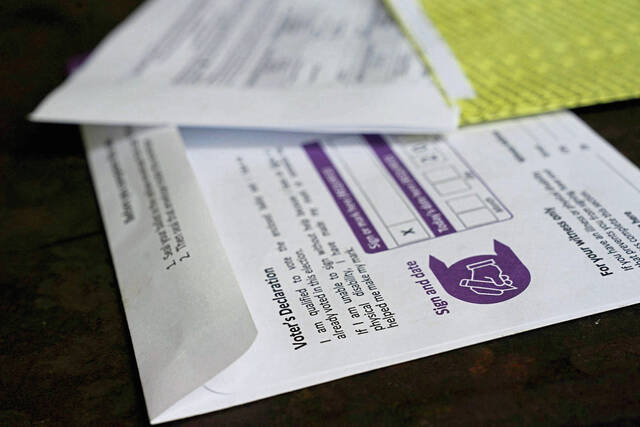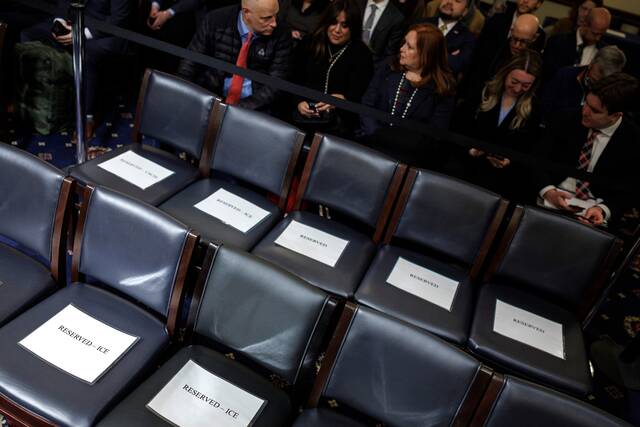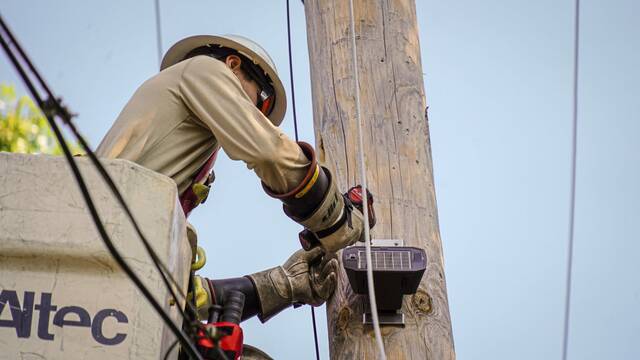Seven Washington County voters sued their board of elections Monday, alleging the board’s decision to not relay information about errors on mail-in ballots — and therefore not giving them a chance to cure those errors — violates their constitutional right to vote.
The lawsuit was filed by the American Civil Liberties Union of Pennsylvania, as well as Public Interest Law Center, on behalf of the individual voters, Center for Coalfield Justice and the Washington Branch of the NAACP.
It alleges due-process violations and seeks an injunction requiring the Washington County Board of Elections to properly input voters’ data into a statewide system so they can learn of any mistakes made on their ballots.
“We’re asking Washington County to support voting, not obstruct voting,” Mimi McKenzie, the legal director of the Public Interest Law Center, said Monday at a news conference.
David Gatling, president of the NAACP’s Washington County branch, called the board’s decision “voter suppression.”
“Their actions undermine the integrity of the election system,” Gatling said. “Public officials who run elections should be doing everything in their power to encourage voting and count ballots, not finding sneaky ways to keep voters from having their ballots counted.”
Witold “Vic” Walczak, the legal director of the ACLU of Pennsylvania, said the plaintiffs in the case are bipartisan and the suit is not designed to help any particular party or candidate.
Messages left with Washington County Commissioners Nick Sherman, Electra Janis and Larry Maggi, who serve as the board of elections, were not returned Monday. A message left with the county’s solicitor, Gary Sweat, also was not returned.
Current Pennsylvania law, the complaint said, disqualifies mail-in ballots if the declaration envelope is not signed or dated, if the date is incorrect, or if the secrecy envelope is not included.
According to the lawsuit, the board of elections in April voted, 2-1, to change its previous policy that alerted voters to errors on their mail-in ballots and gave them the opportunity to fix them.
The policy change, the complaint said, meant that 259 voters in this year’s primary were disenfranchised.
Under Pennsylvania’s Statewide Uniform Registry of Electors — the SURE system — when a county elections board detects an error on a mail-in ballot, the database is to be updated, according to the lawsuit.
If a ballot is canceled, the system triggers an email notification to the voter giving the option of requesting a new ballot or going to their polling place on election day to cast a provisional ballot.
Counties also can use a “pending” status code, which alerts voters via email of an error on their mail-in ballot that could be fixed, the complaint said.
The lawsuit alleges that nearly all of Washington’s neighboring counties, including Allegheny, Beaver, Fayette and Greene, offer steps for voters to cure their ballots.
Westmoreland County lacks a curing process or policy, according to Westmoreland County Election Bureau Director Greg McCloskey.
“These steps are effective in both preserving voters’ right to have their vote counted and promoting the counties’ interest in fair and orderly election administration,” the lawsuit said.
Washington County used to allow voters to cure their ballots.
But that changed April 11, when the board of elections voted to change how defective ballots were entered into the SURE system — marking them as received, instead of canceled or pending.
After the vote, the ACLU and Public Interest Law Center sent a letter to Washington County urging it to reverse course, but the board never responded.
Then, at the board’s April 18 meeting, 28 people asked the board to revert to its original policy and allow the curing of mail-in ballots, while seven people said they approved of the new rule, the lawsuit said.
Maggi, a Democrat, urged his two Republican colleagues to reconsider their decision, but the idea was rejected, the complaint said.
That meant voters with defective mail-in ballots were not told about their mistakes, only that their votes had been received.
The Help America Vote Act of 2002 required states to implement a statewide database to track and manage voters, and SURE provides that mechanism.
The Department of State offers individual counties guidance on how to handle mail-in ballots in the SURE system, but the state Supreme Court said in 2020 that guidance is not law, Walczak said.
SURE does not require counties to offer ballot curing.
The complaint also alleges that the board instructed the election office staff not to provide any information to voters who asked about the status of their mail-in ballots, including whether there were errors that prevented them from being counted.
The complaint also said Washington County refused to provide a publicly available list of voters with deficient mail-in ballots, as required by the state election code.
Of the rejected ballots, 126 had an incomplete date on the envelope.
Three-quarters of the voters whose ballots were rejected were older than 65, the lawsuit said.
The voters who are named as plaintiffs include:
Jeffrey Marks, 72, of Washington; Erika Worobec, 45, of Cecil; Sandra Macioce, 64, of Canonsburg; Kenneth Elliott, 48, of Amity; and David Dean, 54, of Canonsburg. They had an incomplete date on the declaration envelope.
Bruce Jacobs, 65, of Venetia did not have a signature and date on the declaration envelope. And June DeVaughn Hython, 85, of Canonsburg had a declaration envelope that was not dated, and the signature was in the wrong space.
Jacobs, a retired occupational therapist, said Monday that voting has always been important to him and his family. He began voting by mail in 2021 during covid.
In this year’s primary, Jacobs said he believed he did everything correctly and didn’t learn about the mistake on his ballot — or that it wasn’t counted — until months later.
“The Washington County election officials knew I made a mistake,” Jacobs said. “When they received my ballot, they knew that they would reject that ballot because of this mistake, but they never notified me.
“I would have done everything I could have to rectify that.”
Jacobs said he believes elected officials should do everything possible to protect the rights of their constituents to vote.
“I joined this case because county officials have eroded people’s rights and the dignity of our elections,” he said.
In the 2022 general election, 16,000 mail-in ballots in Pennsylvania were set aside because of those errors, the lawsuit said.
The Pennsylvania Department of State redesigned mail-in ballots for the 2024 primary, but still, more than 8,000 were rejected because of the problems with the declaration or secrecy envelopes.
In May, the ACLU filed another lawsuit against Pennsylvania’s secretary of state and elections boards in Allegheny and Philadelphia counties, challenging the constitutionality under state law of requiring the handwritten date on the outside secrecy envelope.
Walczak of the ACLU said he hopes the May lawsuit, along with the latest one, will bring clarity to mail-in voting in Pennsylvania.
“Our goal is to get a decision on all of these issues before voting starts in mid-September,” Walczak said. “This is about clearing away barriers to voting.”








